Overview
Securing business loans without a trading history is not only possible but also achievable through tailored financing options. Consider avenues such as:
- Unsecured loans
- Low-documentation financing
- Alternative funding sources like crowdfunding
- Peer-to-peer lending
Presenting a solid business plan is essential; it demonstrates your vision and strategy to potential lenders. Furthermore, maintaining a strong personal credit score can significantly enhance your credibility. Understanding lender requirements is crucial as well, as it allows you to align your application with their expectations. By implementing these strategies, you can significantly enhance your chances of obtaining funding for new ventures.
Introduction
In the dynamic landscape of entrepreneurship, securing funding can often feel like navigating a maze—especially for startups without a trading history. Business loans tailored for new ventures are emerging as vital lifelines, offering essential capital to ambitious entrepreneurs ready to bring their innovative ideas to life.
As traditional lending criteria evolve, a range of financing options—from unsecured loans to alternative solutions like crowdfunding—are becoming increasingly accessible. This article delves into the intricacies of obtaining business loans for new ventures, exploring the unique challenges faced by startups, the types of loans available, and expert tips to enhance the chances of approval.
With the right strategy and support, aspiring business owners can unlock the financial resources they need to thrive in a competitive market.
Understanding Business Loans for New Ventures
Financial assistance for new enterprises is specifically tailored to meet the distinct requirements of startups and those seeking business loans without a trading history. These financial aids provide essential capital for entrepreneurs to launch their ventures, covering critical expenses such as equipment, inventory, and operational costs. Unlike traditional funding, which typically requires a proven track record, these financing options prioritize the potential of the business idea and the entrepreneur's capability to execute it effectively.
In 2025, the landscape for securing business loans without a trading history is evolving, offering various options to new business owners. Unsecured credit, low-documentation financing, and alternative funding solutions are becoming increasingly popular. These options empower entrepreneurs to access funds without the stringent requirements often associated with traditional lending.
Statistics indicate that a significant percentage of new businesses are successfully obtaining business loans without a trading history. Recent data shows that approximately 30% of startups received business loans in 2025, highlighting a growing recognition among lenders of the potential inherent in innovative entrepreneurial ideas.
Furthermore, IBISWorld estimates that lending to private non-financial corporations (PNFCs) will reach £496 billion in 2023, reflecting a robust growth trend in the lending market.
Expert opinions emphasize the importance of presenting a solid plan and demonstrating the entrepreneur's commitment and capability. Financial experts suggest that startups focus on articulating their vision clearly and showcasing their market research to enhance their chances of securing funding. Shane, the Founder and Funding Specialist Director at Finance Story, utilizes his extensive experience in organizational improvement and funding solutions to guide entrepreneurs through this process, ensuring they understand the loan repayment criteria and how to present a compelling case to lenders.
His unique insights into the positive impact of cleverly selected property, automation, and technology solutions on growth further enhance his ability to assist startups.
Shane holds a BEng Hons in Manufacturing Engineering and a Diploma in Finance & Mortgage Broking, adding to his credibility in the field. Case studies illustrate successful funding examples for new ventures that utilize business loans without a trading history. For instance, a technology company succeeded in obtaining business loans by showcasing an engaging model and a comprehensive plan for product development, despite lacking prior trading history.
This case exemplifies how a well-prepared pitch can resonate with lenders and lead to successful financing outcomes. Moreover, Finance Story distinguishes itself from rivals through its dedication to innovation and flexibility in the lending process, offering customized solutions for new ventures navigating these challenges.
As the lending environment continues to evolve, comprehending the different financing alternatives available is essential for emerging entrepreneurs. By utilizing creative financing options and effectively conveying their growth potential, new ventures can navigate the challenges of obtaining funding and prepare for future success.
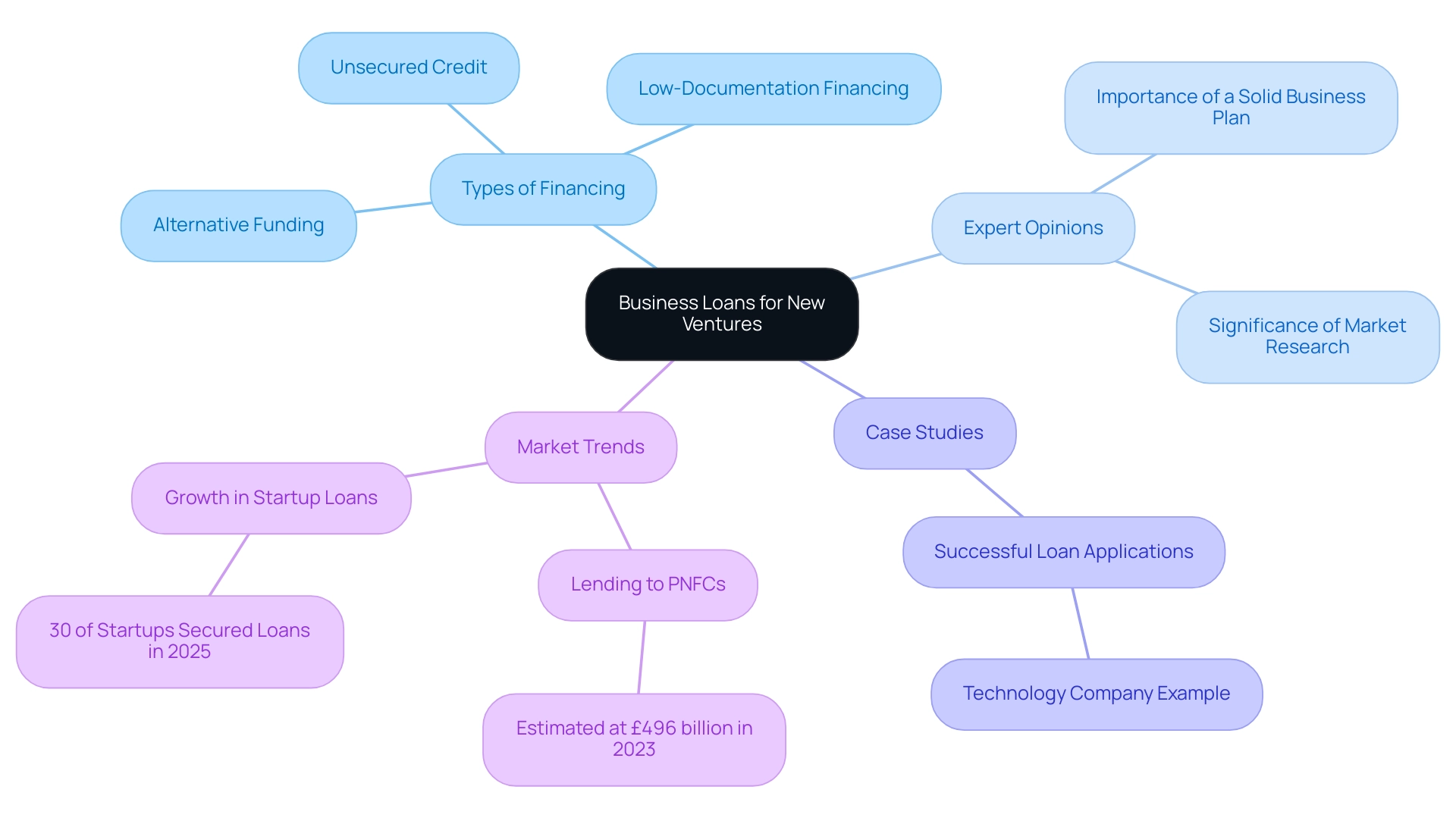
Challenges of Securing Loans Without Trading History
For new enterprises, obtaining business loans without a trading history poses significant challenges. Lenders often categorize new ventures as high-risk investments due to the lack of established financial data that typically indicates a company's capacity to generate revenue. This absence of a proven track record can result in elevated interest rates and stricter eligibility criteria, with some new businesses facing outright loan denials.
Consider this: a survey revealed that 56% of companies sought financing in 2020 primarily to cover operating expenses, while 31% aimed to expand or acquire assets, and 23% intended to replace or repair capital assets. However, new businesses may find it particularly arduous to secure business loans without trading history. Many traditional lenders demand comprehensive documentation, including financial statements and cash flow projections, which new business owners often struggle to provide.
Furthermore, the landscape for new ventures is laden with obstacles. A notable case study highlighted that, despite facing challenges such as securing investment and research and development, 80% of Australian new ventures expressed optimism about their prospects for the upcoming year. This optimism exists alongside the stark reality that 75% of new ventures in the FinTech sector fail within two decades, underscoring the risks associated with lending to emerging businesses.
Expert opinions suggest that flexible banking solutions can empower founders to manage cash flow more effectively and access a variety of financial tools as needed. Shane, the Founder and Funding Specialist Director at Finance Story, possesses a deep understanding of these dynamics. His extensive experience in enhancement consulting, combined with his qualifications (BEng Hons in Manufacturing Engineering and Dip Finance & Mortgage Broking), enables him to offer tailored financial solutions that address the unique challenges faced by new ventures, particularly in navigating loan repayment requirements.
Moreover, Shane's expertise in crafting persuasive proposals for lenders enhances his ability to assist new ventures in securing essential funding.
For enterprises operating under a lease or those without a physical structure, financing alternatives may be limited to cash reserves or equity in owned assets. For instance, if a home is valued at $1.3M with $300k owed, borrowing up to 80% LVR could yield $740k in equity available for acquisition, supplemented by any cash savings. Understanding how to leverage property equity is crucial for small business owners seeking financing.
Nevertheless, the reality remains that numerous new ventures are denied business loans due to the lack of trading history, which can hinder their growth potential. Additionally, it is noteworthy that crowdfunding is utilized by only 1% of entrepreneurs, typically for innovative concepts, presenting an alternative financing option that startups might consider despite their challenges. Understanding these hurdles is essential for navigating the application process and enhancing the likelihood of obtaining vital funding.
Types of Business Loans Available Without Trading History
Startups that lack a trading history can access business loans tailored to their unique requirements. These options include:
-
Unsecured Business Loans: Particularly appealing for new businesses, these loans do not require collateral. However, due to the inherent risk for lenders, they typically come with higher interest rates. As of early 2023, the effective interest rate on new SME financing was recorded at 5.92%, reflecting the competitive landscape of unsecured credit.
-
Low-Doc Financing: Ideal for startups that may lack extensive documentation, low-doc financing requires minimal paperwork. This streamlined process allows new entrepreneurs to secure funding more easily, facilitating their entry into the market without the burden of exhaustive documentation.
-
Secured Financing: Although these funds require collateral, they can be more attainable for new enterprises if the owner is prepared to use personal assets as security. This option can provide a pathway to funding while potentially offering lower interest rates compared to unsecured financing.
-
Alternative Financing Options: Startups can also explore innovative funding solutions such as peer-to-peer lending, crowdfunding, and invoice financing. These alternatives provide flexibility and can be especially advantageous for organizations in need of business loans with no trading history, enabling them to access diverse sources of capital.
The increase in unsecured funding for new enterprises has been significant, with numerous lenders acknowledging the potential of emerging businesses. Success stories abound, particularly with low-documentation options, where entrepreneurs have successfully navigated the funding landscape despite limited documentation. For example, the UK Government's Start Up Financing program has offered considerable assistance, with over 118,000 funds amounting to more than £1.1 billion, greatly improving the survival rates of new businesses.
As Finance Story emphasizes, "Creating a polished and highly individualized case is vital for securing the right funding for your commercial investments." This underscores the importance of a customized strategy in obtaining financing, which is essential for new ventures lacking a trading history. By collaborating with Finance Story, entrepreneurs can access a complete array of lenders and funding solutions that cater to their specific situations, including options for acquiring different types of commercial properties such as warehouses, retail spaces, factories, and hospitality ventures, as well as refinancing current debts to meet the changing requirements of their enterprises.
In summary, comprehending the various categories of financing options, including business loans with no trading history, is essential for entrepreneurs aiming to obtain funding. By utilizing choices such as unsecured funding, low-documentation financing, and alternative capital, new enterprises can position themselves for growth and success in a competitive market. With Finance Story's reputation for professionalism and deep understanding of the finance sector, entrepreneurs can find the guidance they need to navigate these options effectively, including insights into repayment criteria that are essential for sustainable financing.
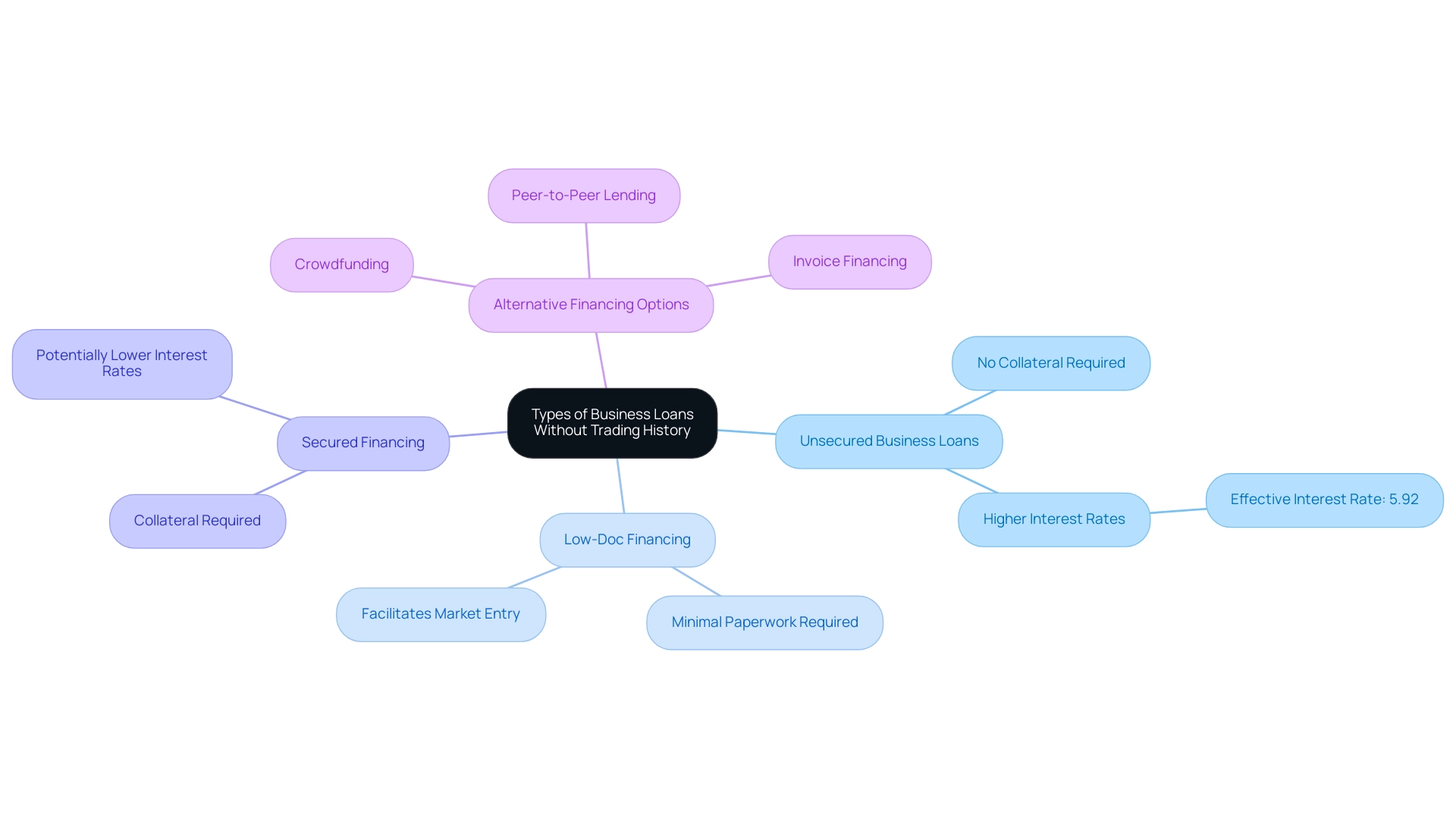
Eligibility Criteria for No Trading History Loans
When seeking financing without a trading history, providers evaluate several critical eligibility criteria to assess the viability of the application:
- Plan: A meticulously crafted plan is paramount. It should outline the commercial model, conduct a thorough market analysis, and include financial projections. This document serves as a guide for the company, demonstrating to financiers that the owner possesses a clear vision and strategy for success.
- Personal Credit History: Financiers often examine the personal credit history of the company owner. A strong personal credit score reflects financial responsibility and reliability, which are crucial for gaining creditor confidence, especially in the absence of a trading history.
- Cash Flow Projections: Even without prior trading data, presenting realistic cash flow projections illustrates the potential for revenue generation. This aids creditors in comprehending the company's financial prospects and its capacity to fulfill debt responsibilities. Lenders will also consider the organization's ability to manage repayments during slower periods, ensuring cash reserves are available to cover obligations.
- ABN and GST Registration: Having an Australian Business Number (ABN) and GST registration is typically a prerequisite for credit applications. These registrations confirm the authenticity of the enterprise and its activities.
- Personal Assets: In some cases, creditors may require personal assets to be pledged as security, especially for secured financing. This requirement can reduce the risk for the creditor and improve the chances of financial approval.
Comprehending these criteria is crucial for small enterprise owners, particularly those pursuing business loans with no trading history, as it can greatly impact the probability of obtaining funding. As the lending environment evolves, especially in 2025, the focus on thorough enterprise strategies and personal credit evaluations remains a fundamental aspect of the borrowing application process. Furthermore, it is essential to highlight that lenders, including those at Finance Story, are concerned about not imposing financial strain on borrowers. This emphasizes the necessity of ensuring that the entity can sustain itself and handle repayments efficiently.
Required Documentation for Loan Applications
When applying for business loans without a trading history, it is essential for applicants to assemble a robust set of documentation to maximize their chances of approval. The following key documents are typically required:
- Business Plan: This comprehensive document should detail the business concept, target market, competitive analysis, and financial forecasts. A well-organized plan not only demonstrates the viability of the venture but also showcases the applicant's understanding of the market landscape.
- Personal Identification: Valid identification, such as a driver's license or passport, is essential to verify the identity of the applicant.
- Financial Statements: If accessible, personal financial statements or tax returns can offer creditors insight into the applicant's financial background and stability, which is especially crucial for those applying for business loans without a trading history.
- Cash Flow Projections: Detailed projections outlining expected income and expenses for the first few years of operation are critical. These projections assist financial institutions in evaluating the potential for profitability and the applicant's capability to manage finances effectively.
- ABN and GST Registration: Proof of registration, such as an Australian Business Number (ABN) and Goods and Services Tax (GST) registration, is often required to validate the legitimacy of the enterprise.
In 2025, financial institutions may require a deposit of 10-20% for loans exceeding $150,000, particularly if the business has been operating for less than 12 months. This statistic underscores the importance of having a solid financial foundation and documentation in place.
Common documentation issues faced by startups include incomplete financial records and insufficient cash flow projections. Addressing these challenges proactively can significantly improve the likelihood of securing funding. As Andrew Beckett, Head of Broker and Third Party Distribution, emphasizes, "Understanding what your bank statements are going to look like to the lender is a big thing. You've got to be ready to answer questions about the incomings and outgoings. If you’re not, you could get caught out." This highlights the significance of being prepared to discuss your financial history and credit score, which can help establish realistic expectations for approval and interest rates.
Successful examples of plans used for loan approvals often incorporate detailed market analysis, clear financial goals, and contingency strategies that demonstrate preparedness for potential challenges. By focusing on these elements, applicants can craft compelling narratives that resonate with lenders, ultimately increasing their chances of obtaining the necessary financing.
At Finance Story, Shane Duffy, our Founder and Funding Specialist Director, leverages his extensive experience in growth and financial solutions, along with his qualifications (BEng Hons in Manufacturing Engineering and Dip in Finance & Mortgage Broking), to guide clients through the lending process. His insights into borrowing repayment criteria and customized financial strategies can significantly enhance your application. Shane is particularly skilled at assisting small enterprise owners in managing common documentation challenges, ensuring they are well-prepared for scrutiny by financiers.
Schedule your free personalized consultation with Shane today to discuss your needs and goals, and let us help you create your next chapter.
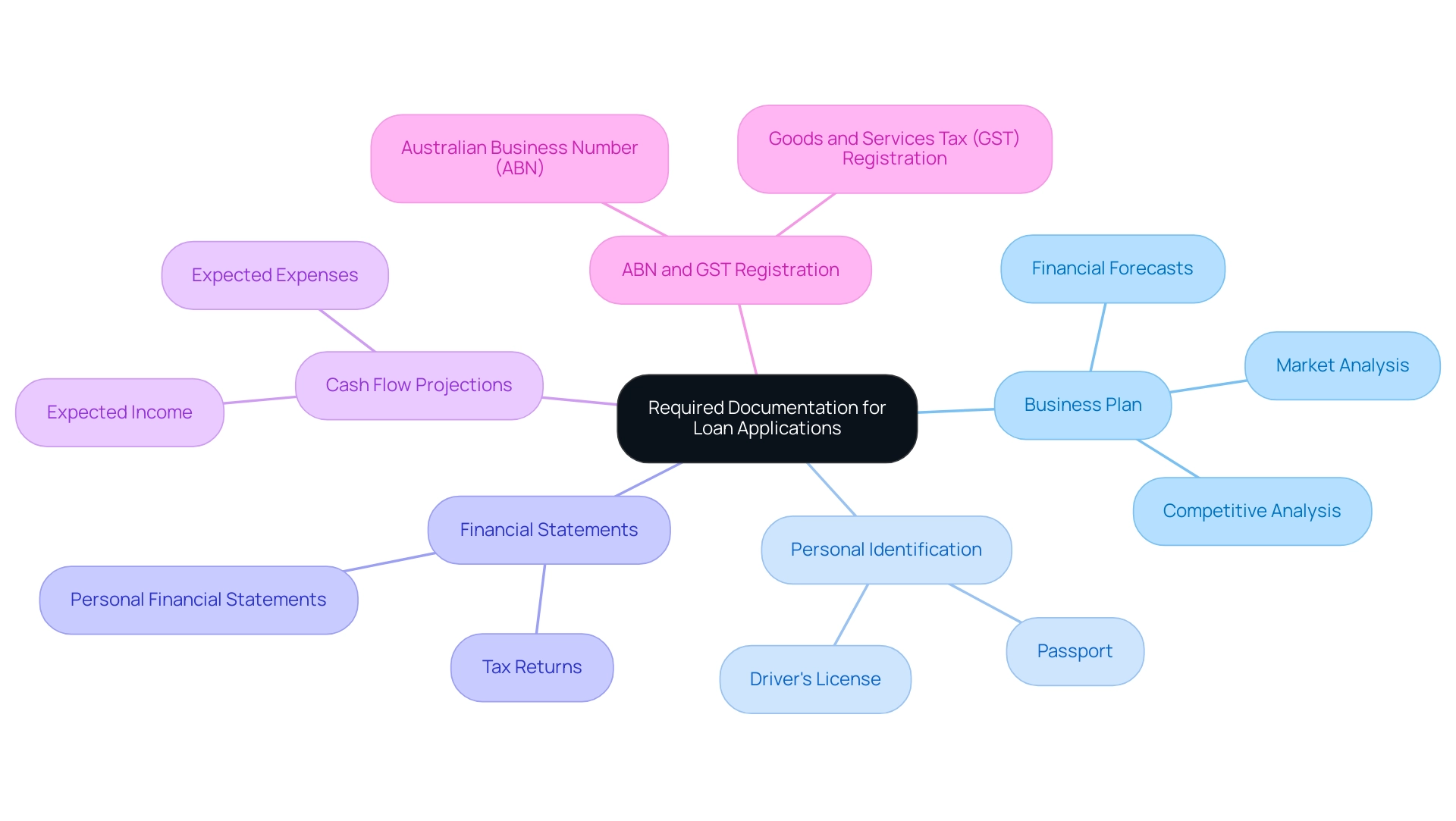
Understanding Personal Guarantees and Security Requirements
When companies seek business loans without a trading history, creditors frequently require personal guarantees. A personal guarantee is a legal commitment from the owner, ensuring repayment of funds should the enterprise fail to do so. This requirement serves as a crucial security measure for financiers, allowing them to pursue the owner's personal assets in case of default.
In 2025, statistics indicate that approximately 70% of creditors mandate personal guarantees for such financing, reflecting the heightened risk associated with businesses lacking a financial history.
Additionally, lenders may request collateral to secure financing. Common forms of collateral include real estate, vehicles, or other valuable assets that can be liquidated if necessary. For new businesses, the impact of collateral on financing approval rates is significant; research shows that companies offering collateral are 50% more likely to secure funding than those that do not.
Understanding these security requirements is essential for borrowers, as they can greatly influence the loan's terms and conditions. Financial experts stress that having a clear strategy for presenting personal guarantees and collateral can enhance a startup's chances of securing financing. For instance, in scenarios where companies apply for business loans without a trading history, showcasing personal assets or other forms of collateral can reassure financiers and facilitate the approval process.
Moreover, the landscape of commercial financing is evolving, with lenders increasingly open to alternative forms of security. As noted by industry professionals, the ability to provide a personal guarantee or collateral can significantly bolster a startup's prospects of obtaining financing, even in challenging circumstances. Townsend Wentz, a restaurateur, aptly describes this situation, stating, "It's like trying to stand in quicksand," underscoring the challenges entrepreneurs face in securing funding.
This understanding is vital for entrepreneurs aiming to navigate the complexities of financing effectively. Finance Story, with its expertise in crafting polished and highly individualized loan proposals, is well-equipped to assist clients in addressing these security requirements. By leveraging a comprehensive suite of lenders, including high street banks and innovative private lending panels, Finance Story ensures that small business owners have the best chance of securing the funding they need for their commercial property investments and refinances, whether it be a warehouse, retail premise, factory, or hospitality venture.
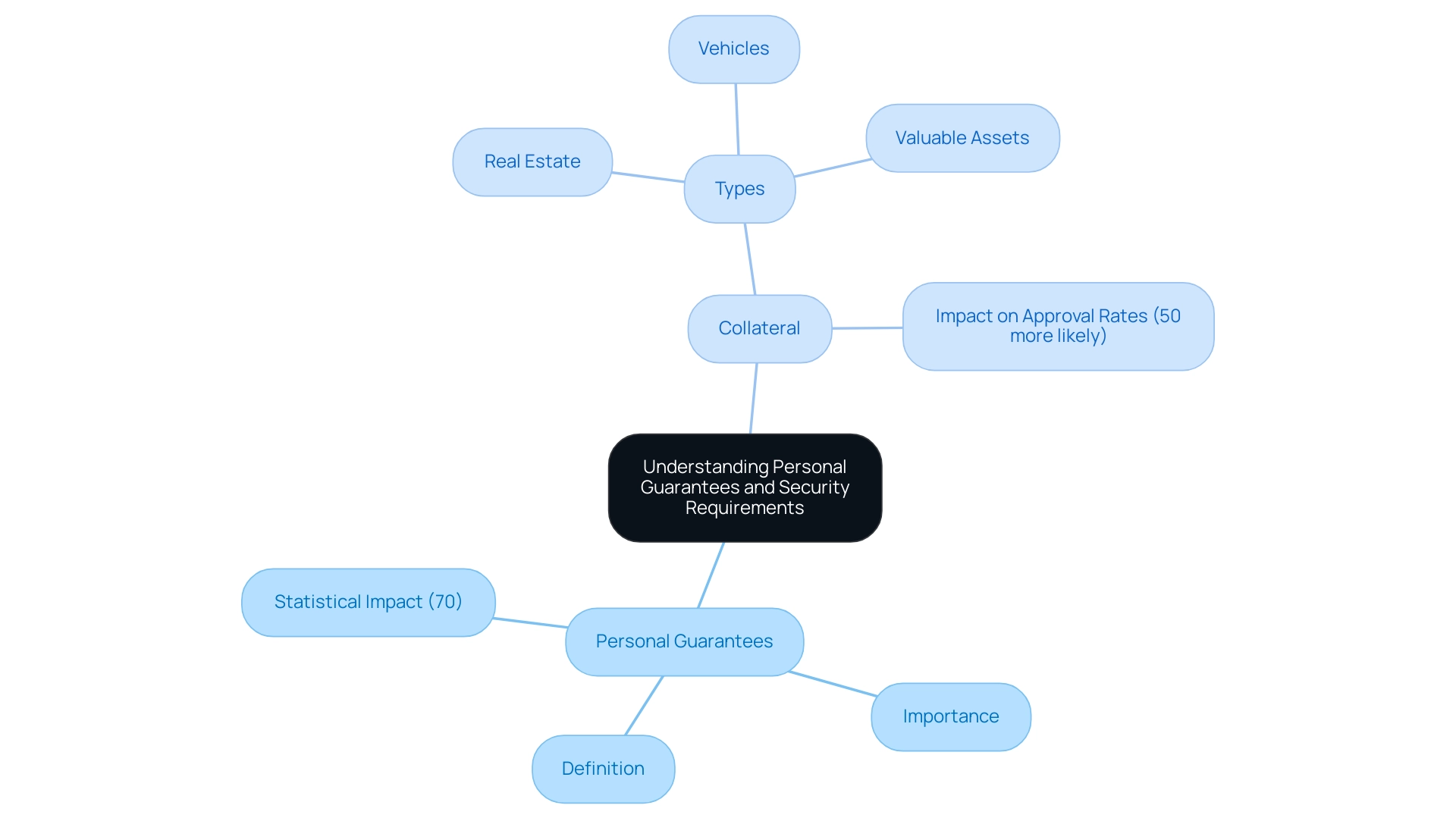
Alternative Financing Solutions for New Businesses
For businesses lacking a trading history, several alternative financing solutions can effectively provide the necessary capital to kickstart operations:
- Crowdfunding: Platforms such as Kickstarter and Indiegogo enable entrepreneurs to raise funds from a broad audience. This method not only permits capital generation but also provides backers early access to products or equity stakes, fostering a community of supporters around the venture.
- Peer-to-Peer Lending: This approach facilitates borrowing directly from individuals through online platforms, effectively bypassing traditional banking institutions. It offers a versatile funding alternative that can be customized to the unique requirements of the venture, making it an appealing option for new enterprises.
- Invoice Financing: Businesses can leverage their unpaid invoices to secure immediate cash flow. This method allows companies to borrow against outstanding invoices, providing quick access to funds through business loans with no trading history, thereby enhancing liquidity.
- Grants and Competitions: Numerous government and private organizations offer grants or funding competitions aimed at new businesses. These opportunities typically do not require repayment, making them an excellent option for new businesses seeking financial support without the burden of debt.
The growth of alternative financing solutions has become increasingly significant, with many entrepreneurs recognizing the importance of flexibility in accessing funds. In fact, 37% of founders cite this flexibility as crucial for managing cash flow and scaling operations effectively. As Isabelle Comber noted, "Flexibility was another common theme throughout our research."
Furthermore, as economic uncertainty persists, many are turning to their professional networks for financial advice, with 40% of founders reflecting a supportive entrepreneurial ecosystem in Australia. This trend highlights the significance of exploring various funding options, particularly business loans with no trading history, for new ventures facing the challenges of building a trading history.
Moreover, while debt financing can be a viable option for startups with stable cash flows, it is becoming increasingly expensive due to rising interest rates. This emphasizes the need for companies to carefully consider their financing options and the implications of each choice.
Tips for Increasing Your Chances of Loan Approval
To enhance your prospects of securing a commercial financing option, especially if you lack a trading history, consider implementing the following strategies:
- Develop a Comprehensive Plan: A well-structured plan is essential. It should outline your operational model, market strategy, and financial forecasts, demonstrating to financiers that you possess a clear vision and a plan for success. Research indicates that companies with solid strategies are significantly more likely to secure financing.
- Maintain a Strong Personal Credit Score: Your personal credit rating is pivotal in credit applications. Regularly review your credit report for inaccuracies and take steps to rectify any issues. A strong credit score not only reflects your financial responsibility but also builds trust with creditors.
- Showcase Effective Cash Flow Management: Creditors want to see that you can manage your finances effectively, even in the early stages of your business. Present a clear plan for cash flow management, detailing how you intend to handle expenses and revenue generation.
- Practice Transparency: Honesty is vital in the loan application process. Provide complete and accurate information to build trust with potential lenders. Transparency can significantly enhance your credibility and increase your chances of approval.
- Seek Expert Guidance: Consulting with a finance broker or advisor, such as Shane at Finance Story, can provide valuable insights into refining your application. With his extensive experience in growth and tailored financial solutions, Shane can help you navigate the complexities of the lending landscape and enhance your proposal. Finance Story offers access to a diverse portfolio of lenders, including high street banks and innovative private lending panels, ensuring you find the right financing option for your needs.
- Understand Borrowing Amount Expectations: For context, the average borrowing size for owner-occupier dwellings in the Australian Capital Territory is approximately $377,000. This figure can assist you in assessing the potential funding you might pursue.
By applying these strategies, you can significantly enhance your likelihood of securing business loans without a trading history. Remember, responsible debt management is key to leveraging personal borrowing effectively. As Shaun McGowan, founder of Money.com.au, emphasizes, education in financial products is crucial for making informed decisions.
Furthermore, Finance Story's innovative lending process, which includes access to a full range of lenders and financing options for various commercial properties such as warehouses, retail premises, factories, and hospitality ventures, can further assist your funding application efforts.
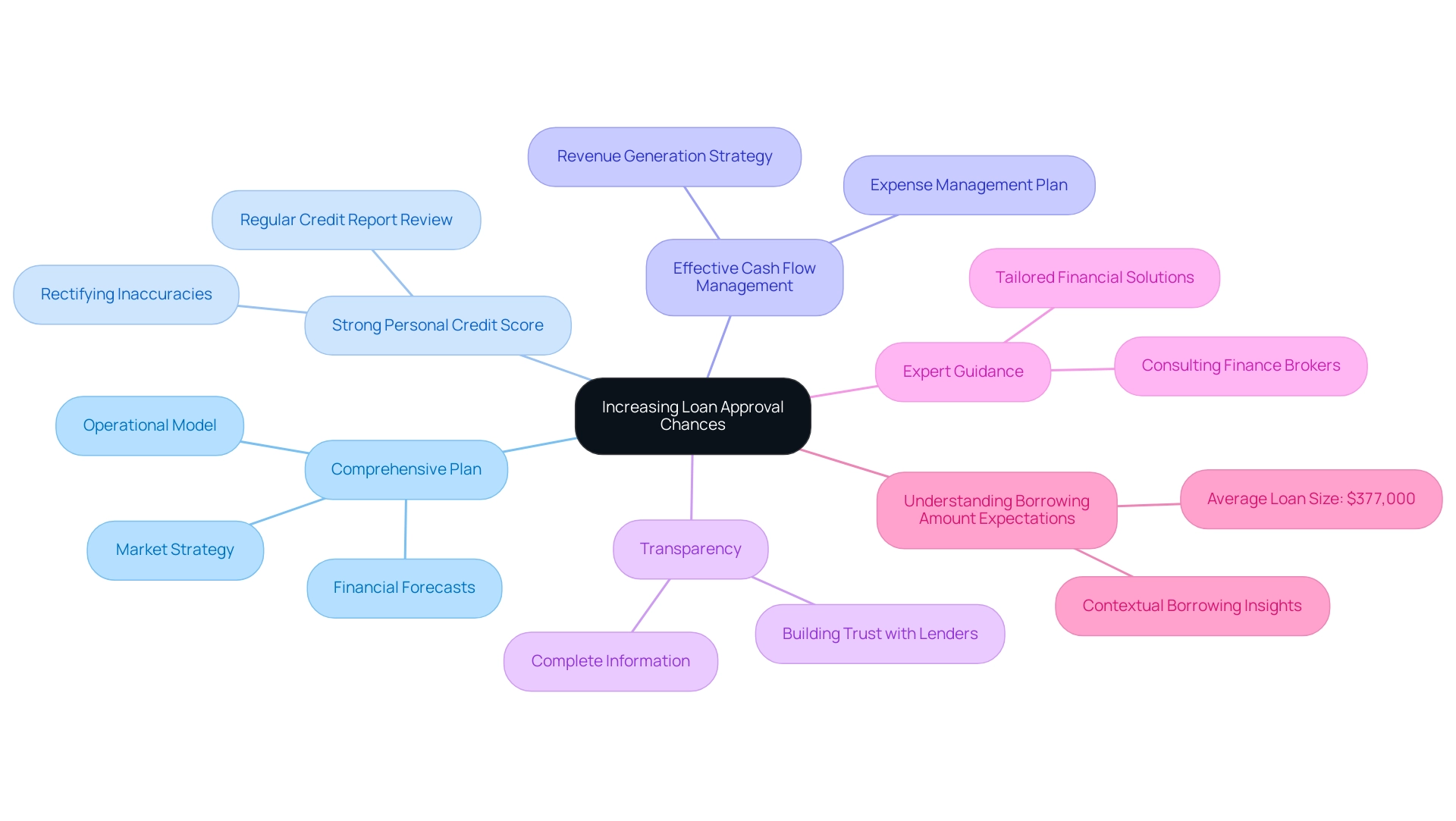
Key Takeaways and Next Steps for Aspiring Business Owners
Securing business loans without a trading history presents significant challenges, yet it is achievable with the right approach. Aspiring business owners must prioritize developing a comprehensive business plan that outlines their vision, market analysis, and financial projections. Understanding the eligibility criteria set by lenders is crucial, as it allows entrepreneurs to tailor their applications accordingly.
In 2025, the environment for new businesses remains competitive, with statistics indicating that 60% of new ventures in the UK face failure. This underscores the importance of strategic planning and adaptability. For those looking to navigate this complex environment, exploring alternative financing options such as peer-to-peer lending or crowdfunding can provide viable pathways to secure necessary funds.
Next steps for aspiring business owners seeking funding include:
- Researching potential financing sources means identifying entities that specialize in offering business loans with no trading history, particularly for startups. This may include boutique mortgage brokerages like Finance Story, which offer tailored financial solutions designed specifically for new enterprises and access to a full range of lenders, including high street banks and private lending panels.
- Gathering Necessary Documentation: Prepare all required documents, including personal financial statements, plans, and any relevant market research that supports your funding request.
- Seeking Professional Advice: Consulting with financial advisors or brokers can provide insights into the financing application process and help navigate potential pitfalls. At Finance Story, you can schedule a free personalized 30-minute consultation with our Head of Funding Solutions, Shane Duffy, to discuss your specific needs and goals, including refinancing options for commercial properties.
Key takeaways for securing business loans in 2025 include:
- Emphasizing Your Unique Value Proposition: Clearly articulate what sets your business apart and how it addresses market needs.
- Building Relationships with Lenders: Establishing rapport with potential lenders enhances trust and improves your chances of approval.
- Being Prepared for Due Diligence: Lenders will conduct thorough checks, so being organized and transparent is essential.
Case studies of successful financing acquisitions show that new ventures effectively conveying their model and illustrating a clear route to profitability are more likely to obtain funding. For instance, technology startups that adapt quickly to market demands and showcase innovative solutions have seen higher success rates in securing funding.
As the number of e-commerce sites continues to rise, with over 26.5 million globally, the competition for funding will only intensify. Therefore, aspiring entrepreneurs must remain proactive and informed about the evolving financial landscape. Notably, the gender distribution among founders shows that 64.3% are male and 35.7% are female, highlighting the increasing diversity in entrepreneurship.
Expert opinions suggest that understanding the nuances of the loan application process is vital for success, as it can significantly impact the likelihood of securing funding. As Josh Howarth observed, "Around 9 in 10 individuals in Saudi Arabia believe they can launch their own venture," reflecting the entrepreneurial spirit that aspiring entrepreneurs should harness. By following these steps and leveraging available resources, including the expertise at Finance Story, entrepreneurs can enhance their chances of obtaining the financial support needed to launch and grow their businesses.
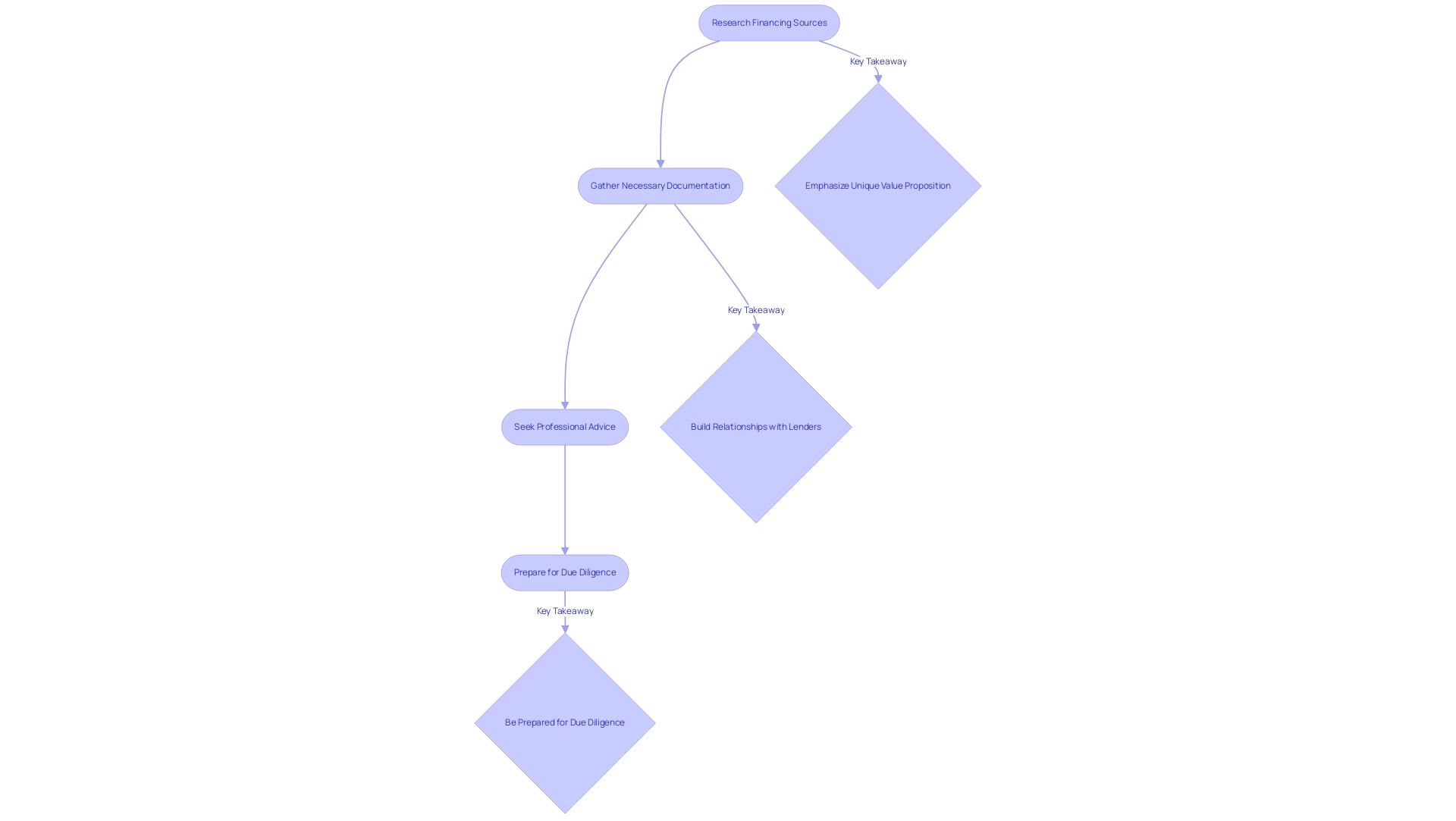
Conclusion
Securing business loans without a trading history presents a significant challenge for new entrepreneurs; however, with the right strategies, it is an achievable objective. A meticulously crafted business plan, which highlights market potential and financial projections, is essential. This documentation not only validates the business idea but also builds trust with potential lenders.
Understanding the eligibility criteria and preparing the necessary documentation are pivotal steps in this journey. Entrepreneurs can explore a variety of loan options—from unsecured and low-doc loans to alternative financing solutions like crowdfunding and peer-to-peer lending. Each option offers distinct advantages that can assist in overcoming the obstacles associated with a lack of trading history.
As the lending landscape transforms, aspiring business owners must adopt a proactive stance. Establishing robust relationships with lenders, maintaining transparency during the application process, and seeking expert advice can greatly improve the likelihood of securing funding. Insights from seasoned professionals, such as those at Finance Story, can provide crucial support in navigating these complexities.
Ultimately, unlocking financial resources hinges on thorough preparation and adaptability. By strategically utilizing available financing options and presenting a compelling case to lenders, startups can effectively position themselves for success in a competitive market. As the entrepreneurial landscape expands, so too do the opportunities for those prepared to take the necessary steps to secure the funding they require.




